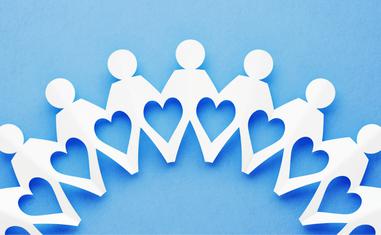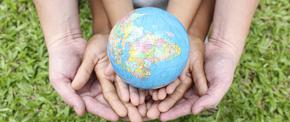The views expressed in our content reflect individual perspectives and do not represent the authoritative views of the Baha'i Faith.
Today, June 23rd, is United Nations Public Service Day. Does that mean we should all do something to serve the public interest? Well, in a way, yes.
Really, though, the UN has designated Public Service Day as a celebration of the value and virtue of public service to the community. This special day recognizes our true public servants – the dedicated people who work in education, government, the non-profit and NGO sector, health care workers, and everyone else who devotes their time, their professions, and their lives to serving others and helping human society.
RELATED: The Great Spiritual Bounty of Service to Humanity
Public Service Day does more than proclaim and celebrate, though – it highlights the contribution of public service in the development process; formally recognizes the work of public servants; and encourages young people to pursue careers in the public sector.
From a Baha’i perspective, Public Service Day affirms the Baha’i principle that work done in the spirit of service to others is regarded as worship, as Abdu’l-Baha expressed in his book The Secret of Divine Civilization:
… is there any deed in the world that would be nobler than service to the common good? Is there any greater blessing conceivable for a man, than that he should become the cause of the education, the development, the prosperity and honor of his fellow-creatures? No, by the Lord God! The highest righteousness of all is for blessed souls to take hold of the hands of the helpless and deliver them out of their ignorance and abasement and poverty, and with pure motives, and only for the sake of God, to arise and energetically devote themselves to the service of the masses, forgetting their own worldly advantage and working only to serve the general good.
In fact, the first formal Baha’i statement to the United Nations, written in 1947 by Shoghi Effendi, the Guardian of the Baha’i Faith, says that the Faith “… exalts any work performed in the spirit of service to the level of worship …”
Baha’is hold public servants in high esteem, and appreciate and praise their work on behalf of others. In a talk he gave in New York in 1912, Abdu’l-Baha said:
…when we see a man doing public service, we must have consideration for him; if he gives a good address, we must praise him; if he makes wise suggestions, and if good intentions appear from him, we must have for him the greatest consideration.
The United Nations now gives awards for effectiveness and excellence in public service. It first established the UN Public Service Awards (UNPSA) program in 2003, and reviewed it in 2016 to align with the 2030 Agenda for Sustainable Development. The UN Public Service Awards promote and reward innovation and excellence in public services by recognizing the creative achievements and contributions of public institutions – which lead to a more effective and responsive public administration in countries around the world.
Recognizing the Best Public Service
The United Nations encourages and works toward effective, accountable and inclusive institutions, and believes them essential to achieving the Sustainable Development Goals (SDGs).
The foundational requirement for those kinds of public service institutions, the Baha’i teachings clearly point out, is absolute honesty, transparency, and accountability. Abdu’l-Baha wrote:
It is obvious that not until the people are educated, not until public opinion is rightly focused, not until government officials, even minor ones, are free from even the least remnant of corruption, can the country be properly administered.
RELATED: What is the Best Way to Worship? Selfless Service to Humanity
In their official statement for Public Service Day, the United Nations has recognized this same basic principle:
Public administration, the cornerstone of governmental work, plays an essential and critical role in improving people’s lives. Reinventing public administration is a positive and necessary way forward. Without public administration modernization and transformation to adapt to today’s needs, realizing a better future for all will be impossible. Where capable administrations are lacking, governments are incapacitated; and where governments are incapacitated, sustainable development falls short.
So today, if you’d like to join Baha’is and everyone else around the world who celebrate UN Public Service Day, go out of your way to thank a teacher, a city councilperson, a school board member, a nurse, or anyone who selflessly serves humanity – they’ll appreciate it, and your gratitude will help strengthen the people and the public institutions in our societies.

















Comments
Sign in or create an account
Continue with Facebookor